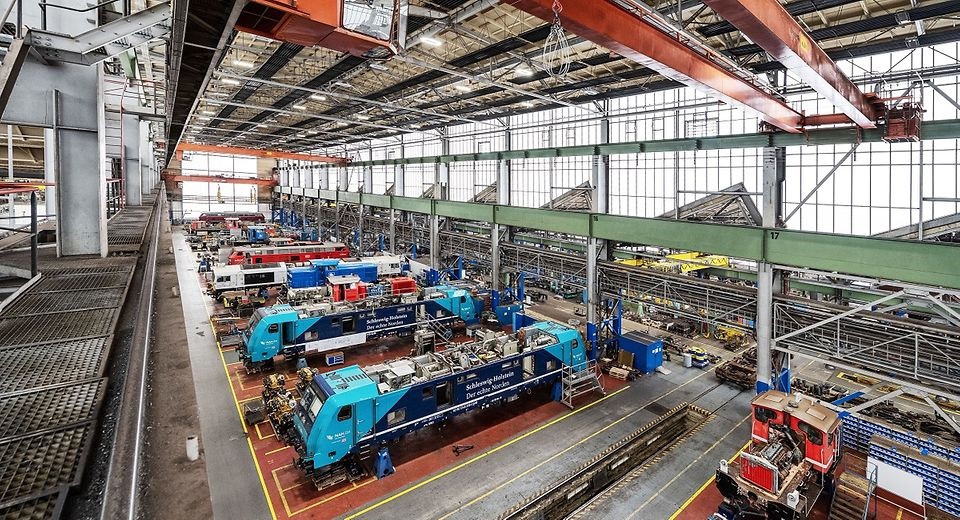
Cottbus/Berlin, 17 September 2020)
The lignite goes – the railway comes: Cottbus is getting the most modern and environmentally friendly railway maintenance plant in Europe.
By 2026, 1,200 new and high-quality industrial jobs will be created. Among them are 100 apprentices who will be able to start their careers under the best conditions.
The plant is the first major project to be financed based on the Federal Government’s Structural Strengthening Act. With the Structural Strengthening Act, the Federal Government and the Länder are helping the regions in Brandenburg, the Free State of Saxony, Saxony-Anhalt, and North Rhine-Westphalia affected by the coal phase-out to create sustainable jobs and new economic structures.
The second important pillar of railway involvement in Lusatia is the expansion of the railway infrastructure. The railway lines from Cottbus to Berlin, Leipzig, Dresden and Görlitz are being extended, electrified, and made fit for higher speeds. The lines to Forst, Guben and the neighbouring Polish region are also undergoing comprehensive modernisation.
With the start of construction in 2023, a new ICE hall for heavy maintenance of electric multiple units (ICE 4), a hall for converting diesel vehicles to hybrid technology with electric drive, a technology centre for hybrid research and modern training workshops will be built on the site of the current Cottbus railway works.
The plans for Cottbus and Lusatia were presented today by the Federal Minister of Finance, Olaf Scholz, the Federal Minister of Transport and Digital Infrastructure, Andreas Scheuer, together with Ronald Pofalla, Member of the Board of Management of Deutsche Bahn responsible for infrastructure, and Prof. Sabina Jeschke, Member of the Board of Management responsible for digitalisation and technology, as well as the Minister-Presidents of Brandenburg and the Free State of Saxony, Dr. Dietmar Woidke and Michael Kretschmer, respectively.
Ronald Pofalla, DB Board Member for Infrastructure stressed that “the lignite goes, the railway comes. The coal phase-out has become a viable programme for the future. The Cottbus plant, the rail expansion – these are not just projects.
Pofalla added that “they are prospects for an entire region. Lusatia will change for the better: We are creating 1,100 additional jobs and 100 training places here. And we will provide the region with excellent links to the railway network – all arteries will be expanded, there will be more and faster connections from the region in all directions.”
The DB Board Member observed that the project would transform Lusatia into an attractive destination for further industrial settlements, for research and for tourism, adding, “after all, this is about the most important things we can offer: A good future for people, for families, for companies, for an entire region.”
On his part, Olaf Scholz, Federal Minister of Finance said: “We are doing everything we can to ensure that the structural change in Lusatia is a success. By rail we are now bringing more than a thousand good jobs and a state-of-the-art infrastructure to the region. This will give a huge boost to Cottbus and the whole of Lusatia.”
Scholz indicated that the modernisation measures were also good for the climate, stressing that CO2 emissions would be reduced, “and sustainable growth is ensured. All this is good news for Lusatia”.
Andreas Scheuer, Federal Minister of Transport and Digital Infrastructure: “Strong infrastructure means strong region. Deutsche Bahn is building a location of superlatives – modern, innovative, digital – and is thus becoming a job machine: new jobs, new dynamism, new impetus and a clear perspective for the people of Cottbus and Lusatia”.
Brandenburg’s Minister President Dr. Dietmar Woidke made it clear: “The Structural Strengthening Act has been in force since mid-August. Now we finally have clarity for Lusatia and the necessary funds to kick-start future projects. The expansion of the Cottbus railway plant is a key project in this respect. Industrial jobs will be created here immediately. The expansion of the railway plant also fits in perfectly with the other promised infrastructure measures in railways and tracks for Lusatia. We have been fighting for this for a long time. Now we are finally getting started, and I am infinitely happy for the people in the region who deserve it.
Michael Kretschmer, Minister President of the Free State of Saxony: “The new Deutsche Bahn maintenance plant in Cottbus is a strong signal for Lusatia. It creates high-quality jobs and training places and helps to retain qualified skilled workers in the region. A modern rail network is needed for successful structural change so that innovative companies and research institutions can settle in Lusatia in the future. The new plant can make an important contribution to further advancing long-distance passenger transport in Brandenburg and Saxony”.
Prof. Sabina Jeschke, DB Board Member for Digitalisation and Technology: “Here in Cottbus, we are taking the opportunity to build the most modern train maintenance plant in Europe. This plant will be more automated and digitally controlled than any other and is also a beacon for German engineering. Robots, learning machines and artificial intelligence will radically shorten the time ICE trains spend in the workshop. The vehicles can get back on the rails much faster – for punctual rail operations. With the new plant and more than twice as many jobs, we are expanding our capacities enormously. This is necessary because the ICE fleet will grow to more than 420 vehicles by 2026”.
In future, ICE trains will be maintained, repaired, and completely rebuilt at the new Cottbus plant. Cottbus is also the only location in Germany to convert diesel to hybrid trains from 2026 and ensure the maintenance of these vehicles. Experts at the new technology and administration centre are dedicated to hybrid research. The railway maintenance plant in Cottbus has existed for almost 150 years. With its 420 employees, it now belongs to DB Fahrzeuginstandhaltung GmbH (FZI) or DB Vehicle Maintenance GmbH.
